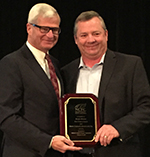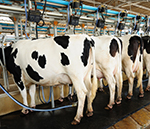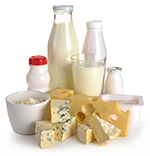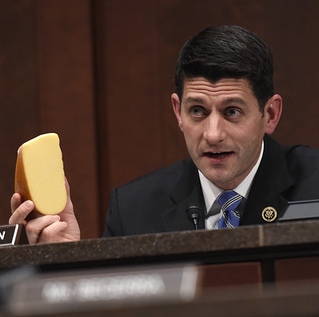 The dairy industry today applauded congressional leaders of the Senate Finance, House Ways and Means, Senate Judiciary, and House Judiciary committees for questioning the way a United Nations agency is considering treaty changes that could erode established trademark rights and, most critically, impair the ability of companies all around the world – including in the United States – to use numerous generic cheese names in export markets.
The dairy industry today applauded congressional leaders of the Senate Finance, House Ways and Means, Senate Judiciary, and House Judiciary committees for questioning the way a United Nations agency is considering treaty changes that could erode established trademark rights and, most critically, impair the ability of companies all around the world – including in the United States – to use numerous generic cheese names in export markets.
In a bipartisan letter to the World Intellectual Property Organization (WIPO), Chairman Orrin Hatch (R-UT), Ranking Member Ron Wyden (D-OR), Chairman Paul Ryan (R-WI), Ranking Member Sandy Levin (D-MI), Chairman Chuck Grassley (R-IA), Ranking Member Patrick Leahy (D-VT), Chairman Bob Goodlatte (R-VA) and Ranking Member John Conyers (D-MI) said the views of the United States and other member countries are not being fully considered as WIPO looks at expanding the scope of the Lisbon Agreement for the Protection of Appellations of Origin.
The eight congressional leaders strongly urged WIPO to follow past practice by allowing all WIPO member countries to have an equal voice in determining any changes to the Lisbon Agreement.
The letter pointed out the broad ramifications of an agreement that fails to sufficiently address the concerns of trademark holders and common name users. The letter states, “Without these safeguards, companies in the United States and elsewhere could see their sales opportunities and intellectual property rights eroded in various markets around the world. This is already occurring in many countries where U.S. companies face geographical indications registrations that threaten to internationally block their use of common food names or negatively impact existing protections for their established trademarks.”
“The proposed changes in the Lisbon Agreement are clearly aimed at preventing U.S. dairy producers and processors, and others, from using names in international trade that they have used for decades, such as feta, parmesan, havarti, asiago and others,” said Jim Mulhern, president and CEO of the National Milk Producers Federation.
Tom Suber, president of the U.S. Dairy Export Council, pointed to the effort to shut out dissenting voices from the process. “Of course countries can strike treaties to address their own goals, but that should not be allowed to come at the expense of others’ long-standing and growing exports,” Suber said.
“Unless these meetings are opened to the larger WIPO membership, the amendments completed by 30 or so countries could adversely affect the rights of all WIPO members to use common food names in global trade,” said Connie Tipton, president and CEO of the International Dairy Foods Association. “The proper protocol must be maintained to ensure the continued growth of U.S. dairy exports.”
The World Intellectual Property Organization is a United Nations agency charged with developing a balanced international intellectual property system. It is scheduled to consider the expansion to the Lisbon Agreement at a meeting in Geneva, Switzerland, in mid-May. Work to prepare for that meeting is actively underway in Geneva.
The National Milk Producers Federation (NMPF), based in Arlington, Va., develops and carries out policies that advance the well-being of U.S. dairy producers and the cooperatives they collectively own. The members of NMPF’s cooperatives produce the majority of the U.S, milk supply, making NMPF the voice of nearly 32,000 dairy producers on Capitol Hill and with government agencies.
The U.S. Dairy Export Council (USDEC) is a non-profit, independent membership organization that represents the global trade interests of U.S. dairy producers, proprietary processors and cooperatives, ingredient suppliers and export traders. Its mission is to enhance U.S. global competitiveness and assist the U.S. industry to increase its global dairy ingredient sales and exports of U.S. dairy products. USDEC accomplishes this through programs in market development that build global demand for U.S. dairy products, resolve market access barriers and advance industry trade policy goals. USDEC is supported by staff across the United States and overseas in Mexico, South America, Asia, Middle East and Europe. The U.S. Dairy Export Council prohibits discrimination on the basis of age, disability, national origin, race, color, religion, creed, gender, sexual orientation, political beliefs, marital status, military status, and arrest or conviction record.
The International Dairy Foods Association (IDFA), Washington, D.C, represents the nation’s dairy manufacturing and marketing industries and their suppliers, with a membership of 550 companies within a $125-billion a year industry. IDFA is composed of three constituent organizations: the Milk Industry Foundation (MIF), the National Cheese Institute (NCI) and the International Ice Cream Association (IICA). IDFA’s nearly 200 dairy processing members run nearly 600 plant operations, and range from large multi-national organizations to single-plant companies. Together they represent more than 85 percent of the milk, cultured products, cheese, ice cream and frozen desserts produced and marketed in the United States. IDFA can be found online at www.idfa.org.
 Cooperatives Working Together helped its member cooperatives in February get contracts to sell 5.3 million pounds of cheese and 4.4 million pounds of butter overseas. The contracted products, which represent the equivalent of 148.5 million pounds of milk on a milkfat basis, will go to customers in 10 countries on five continents.
Cooperatives Working Together helped its member cooperatives in February get contracts to sell 5.3 million pounds of cheese and 4.4 million pounds of butter overseas. The contracted products, which represent the equivalent of 148.5 million pounds of milk on a milkfat basis, will go to customers in 10 countries on five continents.
 NMPF Board Chairman Randy Mooney was named 2014 Director of the Year by the National Council of Farmer Cooperatives. He received the award at NCFC’s annual meeting in San Diego on February 12.
NMPF Board Chairman Randy Mooney was named 2014 Director of the Year by the National Council of Farmer Cooperatives. He received the award at NCFC’s annual meeting in San Diego on February 12. Graduate students researching dairy-related subjects have three weeks left to apply for NMPF’s National Dairy Leadership Scholarship Program. Each year, NMPF awards scholarships to Masters- or Ph.D.-level students conducting research of interest to NMPF member cooperatives and the dairy industry in general.
Graduate students researching dairy-related subjects have three weeks left to apply for NMPF’s National Dairy Leadership Scholarship Program. Each year, NMPF awards scholarships to Masters- or Ph.D.-level students conducting research of interest to NMPF member cooperatives and the dairy industry in general. ARLINGTON, VA – A new report released Thursday by the Food and Drug Administration underscores the safety of the nation’s milk supply, and demonstrates that the regulations to keep drug residues out of milk are effective in protecting the public health, the National Milk Producers Federation said today in reaction to the FDA survey.
ARLINGTON, VA – A new report released Thursday by the Food and Drug Administration underscores the safety of the nation’s milk supply, and demonstrates that the regulations to keep drug residues out of milk are effective in protecting the public health, the National Milk Producers Federation said today in reaction to the FDA survey. The National Milk Producers Federation (NMPF) and the U.S. Dairy Export Council (USDEC) today jointly urged Congress to enact new Trade Promotion Authority (TPA) legislation, saying it is crucial to securing well-negotiated trade agreements, including a Pacific Rim pact that must open key markets to more U.S. dairy products.
The National Milk Producers Federation (NMPF) and the U.S. Dairy Export Council (USDEC) today jointly urged Congress to enact new Trade Promotion Authority (TPA) legislation, saying it is crucial to securing well-negotiated trade agreements, including a Pacific Rim pact that must open key markets to more U.S. dairy products. Statement from Jim Mulhern, President & CEO, NMPF; and Connie Tipton, President & CEO, IDFA
Statement from Jim Mulhern, President & CEO, NMPF; and Connie Tipton, President & CEO, IDFA LA CROSSE, WISCONSIN – The President of the National Milk Producers Federation, in remarks delivered today at a dairy cooperative convention here in western Wisconsin, singled out three of the state’s members of Congress for their leadership efforts to improve trade opportunities for dairy farmers.
LA CROSSE, WISCONSIN – The President of the National Milk Producers Federation, in remarks delivered today at a dairy cooperative convention here in western Wisconsin, singled out three of the state’s members of Congress for their leadership efforts to improve trade opportunities for dairy farmers. The dairy industry today applauded congressional leaders of the Senate Finance, House Ways and Means, Senate Judiciary, and House Judiciary committees for questioning the way a United Nations agency is considering treaty changes that could erode established trademark rights and, most critically, impair the ability of companies all around the world – including in the United States – to use numerous generic cheese names in export markets.
The dairy industry today applauded congressional leaders of the Senate Finance, House Ways and Means, Senate Judiciary, and House Judiciary committees for questioning the way a United Nations agency is considering treaty changes that could erode established trademark rights and, most critically, impair the ability of companies all around the world – including in the United States – to use numerous generic cheese names in export markets. The National Milk Producers Federation (NMPF) and the U.S. Dairy Export Council (USDEC) today applauded House Ways and Means Committee Chairman Paul Ryan’s strong message on agricultural market access to Japan and Canada in the Trans Pacific Partnership free trade talks.
The National Milk Producers Federation (NMPF) and the U.S. Dairy Export Council (USDEC) today applauded House Ways and Means Committee Chairman Paul Ryan’s strong message on agricultural market access to Japan and Canada in the Trans Pacific Partnership free trade talks.



